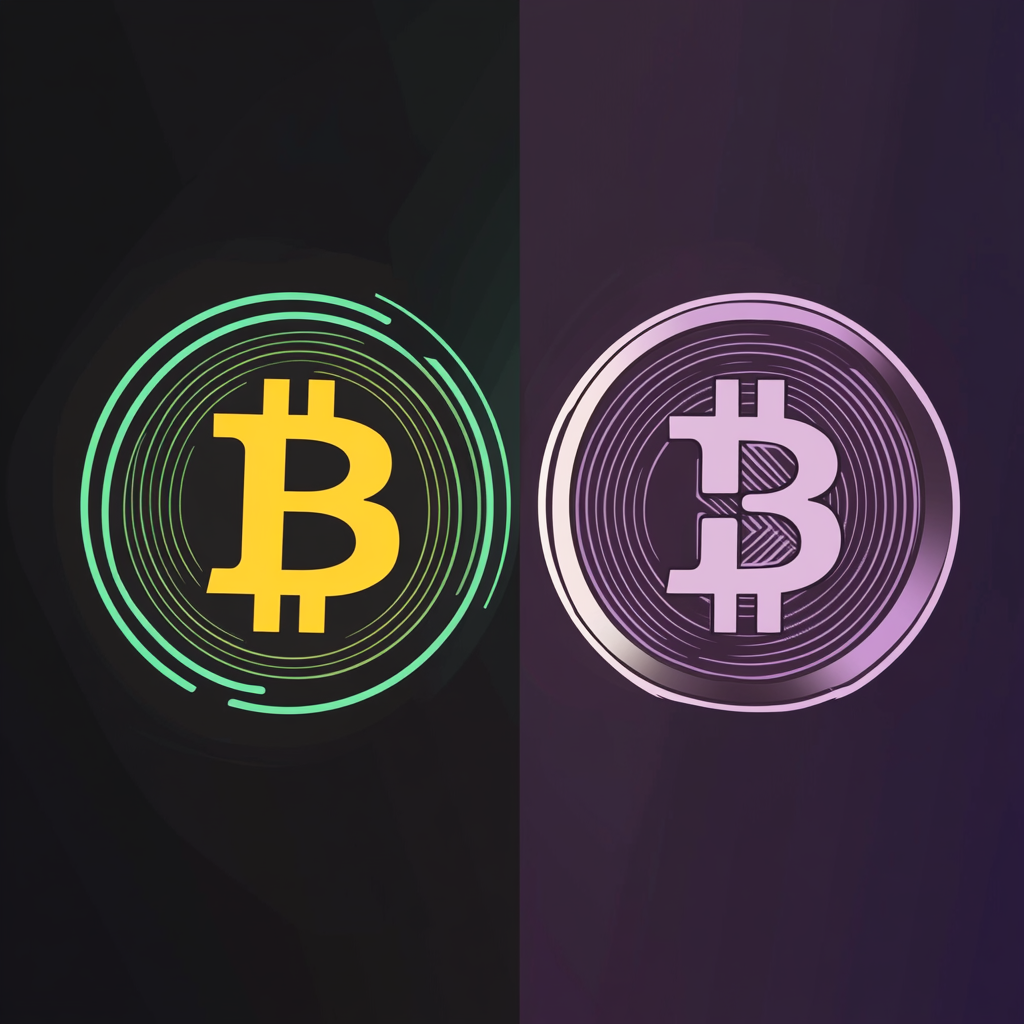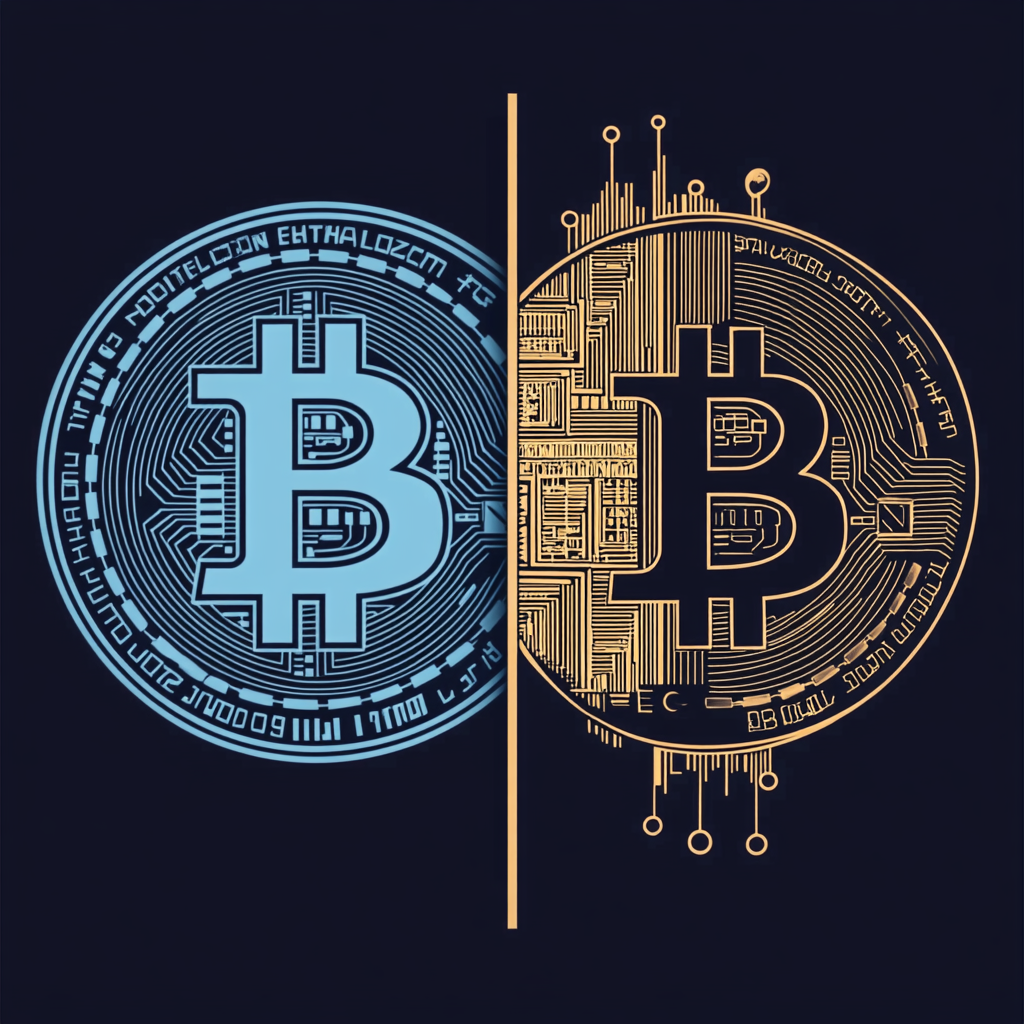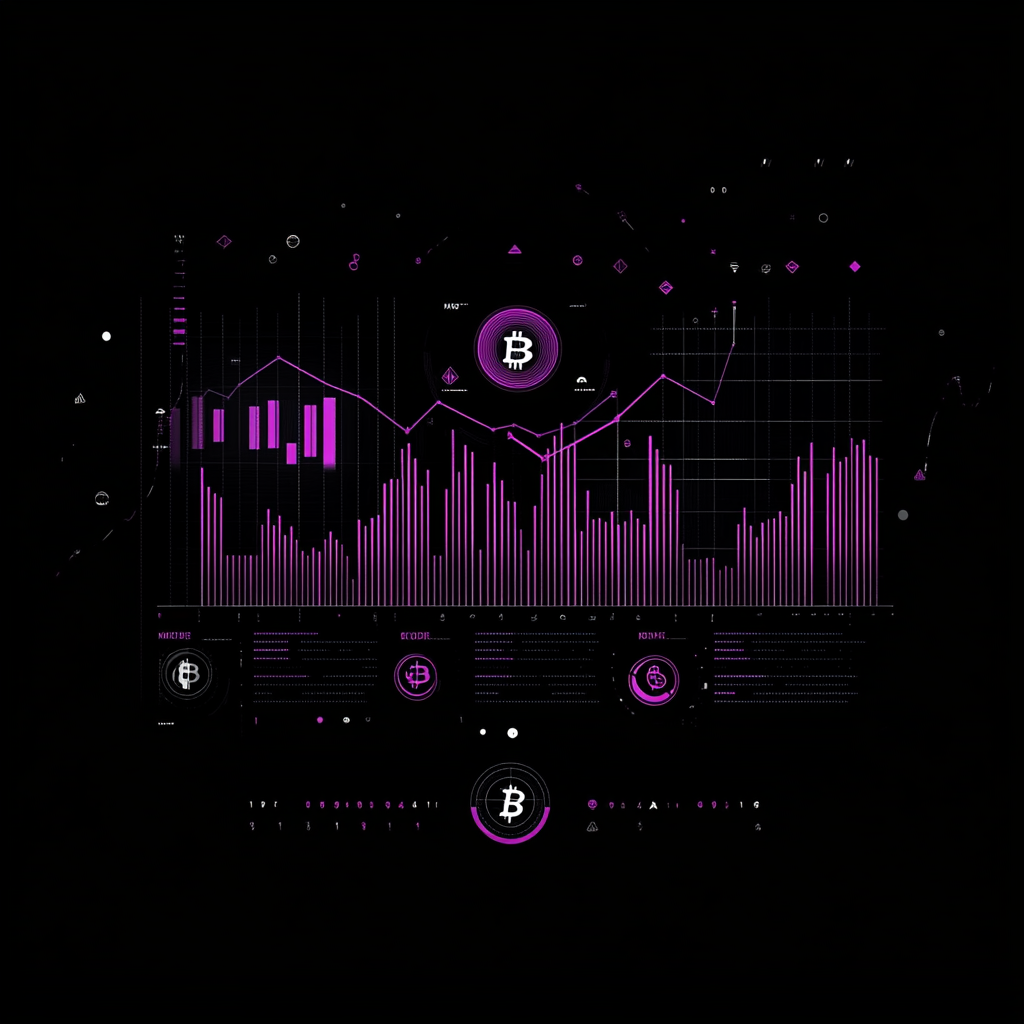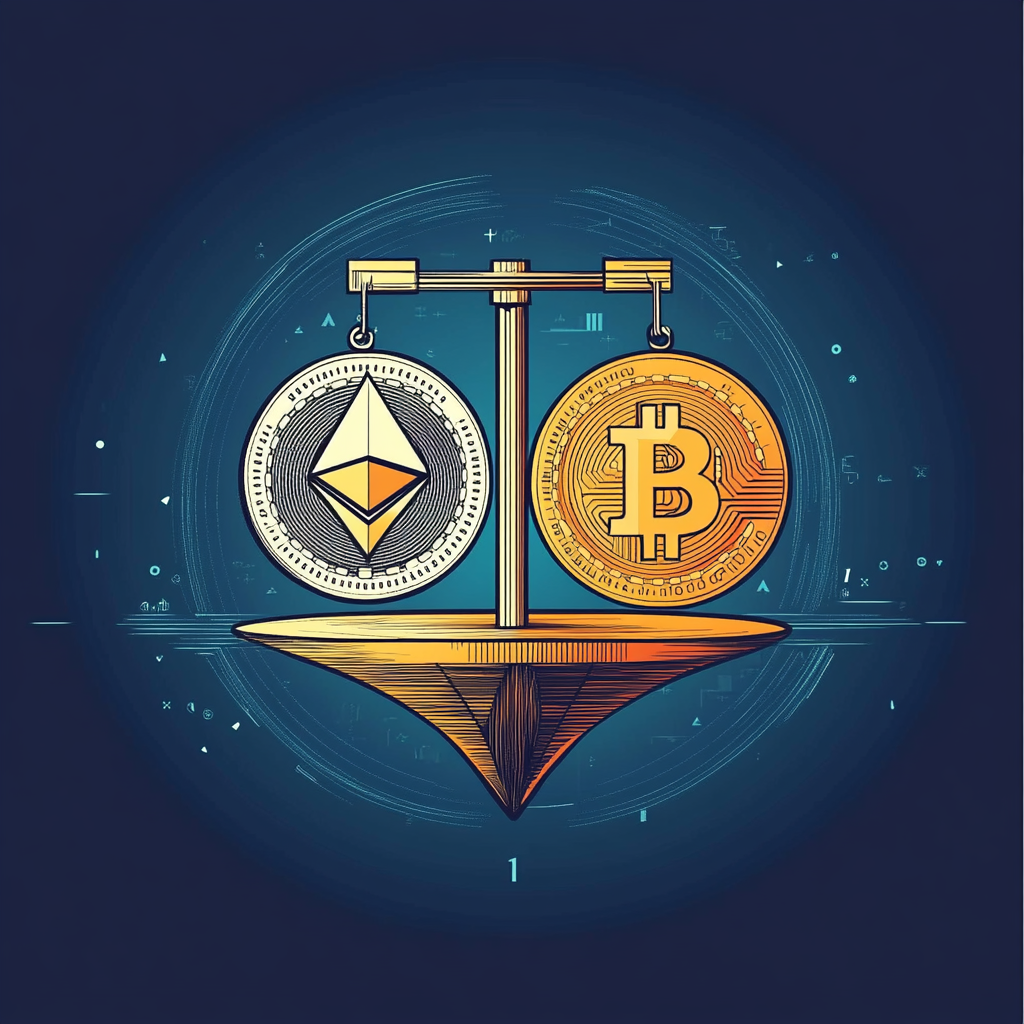Bitcoin vs. Bitcoin Cash: Main Differences and Which Is Better
Cryptocurrency can be confusing, especially when two digital currencies share a similar name—Bitcoin and Bitcoin Cash. Many assume they are the same or struggle to understand their key differences. This confusion makes it difficult for investors and users to decide which best suits their needs. Choosing the right cryptocurrency affects transaction speed, fees, and overall […]

Cryptocurrency can be confusing, especially when two digital currencies share a similar name—Bitcoin and Bitcoin Cash. Many assume they are the same or struggle to understand their key differences. This confusion makes it difficult for investors and users to decide which best suits their needs.
Choosing the right cryptocurrency affects transaction speed, fees, and overall usability. The original cryptocurrency is known for its security and widespread adoption but faces issues like slow transactions and high fees. On the other hand, Bitcoin Cash was created to solve these problems, offering theoretically faster and cheaper transactions. But did they do it and make it the better option?
In this article, we’ll explain the significant differences between Bitcoin vs. Bitcoin Cash in a simple, easy-to-understand way. Let’s dive in!
Bitcoin vs. Bitcoin Cash: A Brief Overview
| Criterion | Bitcoin | Bitcoin Cash |
| Price (at the time of writing) | $98,374 | $328 |
| Market Cap (at the time of writing) | $1.9 trillion | $6.42 billion |
| Circulating Supply (at the time of writing) | 19.81M BTC | 19.81M BCH |
| Max Supply | 21,000,000 BTC | 21,000,000 BCH |
| Blockchain | Bitcoin blockchain | Bitcoin Cash blockchain |
| Consensus Mechanism | Proof of Work (PoW) | Proof of Work (PoW) |
| Block Reward | 3.125 BTC | 3.125 BCH |
| Cryptographic Algorithm | SHA-256 | SHA-256 |
| Token Utility | Peer-to-peer digital cash, store of value, medium of exchange | Peer-to-peer digital cash, low-cost transactions, microtransactions |
| Founders | Satoshi Nakamoto | A group of Bitcoin developers and miners led by Roger Ver and Craig Wright |
| Launch Date | 2009 | 2017 |
| Supporting Exchanges | Binance, Coinbase, OKX, Kraken, Bitget, ByBit, Bitfinex, KuCoin, Crypto.com, Gate.io, HTX, MEXC, etc. | Binance, Coinbase, OKX, Kraken, Bitget, ByBit, Bitfinex, KuCoin, Crypto.com, Gate.io, HTX, MEXC, etc. |
| Communities | Reddit X (Twitter) BitcoinTalk Forum Bitcoin Conferences And Events | Reddit Discord BitcoinCash.org Bitcoin Cash Foundation |
The Genesis of Bitcoin vs. Bitcoin Cash
In 2009, a mysterious figure (or group) known as Satoshi Nakamoto introduced Bitcoin, a digital currency designed to function independently of banks and governments. This idea emerged in response to the 2008 financial crisis when trust in traditional financial institutions was at an all-time low.
The Bitcoin blockchain made transactions secure and transparent, with a hard cap of 21 million coins, ensuring scarcity similar to gold. Over time, Bitcoin earned the nickname “digital gold” and became widely adopted as a secure store of value.
However, as Bitcoin’s popularity grew, so did concerns about transaction speed and costs. By 2017, the network faced congestion, leading to disagreements on how to scale it efficiently.
One faction believed increasing Bitcoin’s block size would make transactions faster and cheaper, while another warned that such changes could harm decentralization and security.
This dispute led to a split, creating Bitcoin Cash (BCH). Bitcoin Cash focuses on adopting larger blocks to process transactions more efficiently, aiming to fulfill what its supporters claimed was Satoshi’s original vision of digital cash.
Despite these claims, Bitcoin Cash struggled to gain mainstream acceptance as the original Bitcoin, partly due to the figures backing it. Roger Ver, an early Bitcoin investor, and Craig Wright, who controversially claimed to be Satoshi Nakamoto, were major supporters of BCH. Their involvement raised concerns within the crypto community, as Wright’s claim was widely disputed, and Ver faced legal issues, including allegations of tax fraud.
Internal conflicts between these two figures eventually led to another split in 2018, with Craig Wright breaking away to create Bitcoin SV (Satoshi Vision), further fragmenting the Bitcoin Cash ecosystem.
BCH vs. BTC: Technical Comparison
1. Blockchain and Consensus Mechanisms
Bitcoin relies on blockchain technology to ensure security and decentralization. Its block size is limited to 1 MB, which restricts the number of transactions per block but helps maintain its strong decentralization. Bitcoin’s Proof-of-Work (PoW) consensus mechanism secures the network by requiring miners to solve complex mathematical puzzles to validate transactions.
While this process ensures a high level of security, it also results in slower transaction speeds and higher fees, especially during heavy network congestion. Despite these trade-offs, Bitcoin’s decentralized nature and institutional backing have reinforced its dominance in the cryptocurrency industry.
Bitcoin Cash was created to address Bitcoin’s scalability issues by increasing block size. Bitcoin Cash initially increased its block size limit to 8 MB and later to 32 MB, allowing for more transactions per block and significantly lower fees.
Like Bitcoin, it operates on a PoW mechanism, ensuring security and functionality. However, decentralization is where BCH struggles. While its technical design improves transaction efficiency, its governance has been affected by internal conflicts and leadership disputes.
The disagreements between Craig Wright and Roger Ver, both controversial individuals, led to further division, culminating in the creation of Bitcoin SV (BSV), further weakening both networks.
Because of this history, Bitcoin Cash faces challenges in gaining trust and adoption. Unlike Bitcoin, which has maintained a decentralized and widely accepted status, BCH and BSV, after that, have been seen as controlled by specific individuals, undermining their credibility.
2. Scalability and Network Throughput
Scalability has long been challenging for the Bitcoin network, as it processes only about 7 transactions per second (TPS). The fact that it can limit throughput can lead to high-demand congestion, resulting in delays and increased transaction fees.
However, the good news is that scalability solutions have been developed to work alongside it rather than altering Bitcoin’s core protocol, which prioritizes security and decentralization.
The Lightning Network, a layer-2 solution, significantly improves transaction speed and cost efficiency, enabling near-instant and low-fee transactions. While its adoption is still growing, it represents a powerful scaling method that aligns with Bitcoin’s decentralized ethos. Similarly, SegWit (Segregated Witness) has helped optimize block space and increase efficiency.
By contrast, the Bitcoin Cash network took a different approach by increasing block size to boost transaction capacity. While this allows it to theoretically handle up to 116 TPS (with a practical throughput of about 61 TPS), larger blocks come with trade-offs, including higher storage and bandwidth requirements, which may affect decentralization over time, one of the pillars of blockchain technology.
3. Transaction Costs and Network Congestion
Bitcoin transaction fees average 0.000012 BTC, while Bitcoin Cash fees are around 0.000028 BCH—and here’s the catch. When comparing fees in their units, Bitcoin transactions are cheaper, considering Bitcoin’s higher value.
However, some platforms present these facts differently by showing transaction fees in USD. From this point of view, BCH might seem a better solution. Bitcoin fees seem more expensive in USD simply because Bitcoin itself is worth much more. If BCH had the same price as BTC, its transaction fees would actually be higher. So, don’t be misled by just looking at dollar amounts.
Bitcoin fees can rise temporarily during peak demand due to its block size limit. However, solutions like the Lightning Network are being developed to make transactions faster and cheaper while keeping Bitcoin secure and decentralized.
As Bitcoin Cash increased its blocks, having larger blocks helped lower fees, but this comes with trade-offs like increased storage and bandwidth needs. When you look at both transaction costs and asset value, Bitcoin remains the more cost-efficient option.
4. Dev Communities, Programming Languages, and Smart Contracts
Bitcoin (BTC) has a strong development community that is continuously enhancing its security and functionality. Its programming language, Script, is intentionally simple, prioritizing security over complexity. This design choice minimizes vulnerabilities, ensuring Bitcoin remains a reliable and robust network.
Although Script does not natively support advanced smart contracts, Bitcoin has evolved through Layer 2 solutions like Stacks, RSK, and Citrea, which introduce smart contract capabilities while maintaining the security of the main blockchain. These developments allow Bitcoin to expand its use cases beyond simple transactions without compromising its decentralized nature.
For custom digital asset creation, Bitcoin relies on the Omni Layer, a platform built for creating and trading custom digital assets and currencies. Omni transactions operate on Bitcoin’s blockchain, providing advanced features for token issuance.
Bitcoin also benefits from an active and well-established developer community. The Bitcoin Core team plays a crucial role in maintaining and upgrading the network, swiftly addressing challenges, and proposing improvements. This continuous development ensures Bitcoin remains adaptable while preserving its fundamental principles.
Additionally, the broader Bitcoin ecosystem, including companies and independent developers, contributes to innovations such as the Lightning Network and various Layer 2 scaling solutions, strengthening its long-term viability.
In contrast, Bitcoin Cash (BCH) extends Bitcoin’s original Script language with tools like CashScript, directly enabling more advanced smart contract functionality on its blockchain.
However, despite these enhancements, Bitcoin Cash lacks widespread developer engagement. Unlike Bitcoin, which has a thriving ecosystem of developers working on security, scalability, and new functionalities, Bitcoin Cash’s developer activity is more limited, which impacts its ability to drive long-term innovation.
The absence of significant Layer 2 development and a smaller developer community makes BCH less adaptable to evolving blockchain needs.
5. DeFi and NFT Capabilities
Bitcoin’s blockchain wasn’t initially designed for NFTs, but advancements like the Ordinals protocol have enabled NFT functionality by assigning unique identifiers to satoshis. While tools like Ordinals and Layer-2 solutions (e.g., Stacks, RSK, and Liquid Network) offer innovative contract capabilities and cheaper NFT creation, Bitcoin’s NFT infrastructure continues to evolve and gain traction.
With growing awareness and adoption, Bitcoin accounts for about 12% of the NFT market. It also has pools with BTC and WBTC on Ethereum, making it more widely used in DeFi, even if its ecosystem isn’t as developed as Ethereum’s. But as this article isn’t about Bitcoin vs. Ethereum, this isn’t a problem.
Bitcoin Cash, with its native smart contract support through CashScript and CashTokens for NFTs, offers more direct functionality for NFT creation. However, it holds less than 0.5% of the NFT market, showing limited adoption compared to Bitcoin.
6. Approved ETFs
Bitcoin (BTC) is the only one with approved Spot ETFs, reinforcing its dominance in institutional investment. According to Yahoo Finance, the most active Bitcoin ETFs of 2024 were:
- iShares Bitcoin Trust ETF ($IBIT) – $37.27B in 1-year flow, $52.15B in assets;
- Fidelity Wise Origin Bitcoin Fund ($FBTC) – $11.81B in 1-year flow, $18.99B in assets;
- ARK 21Shares Bitcoin ETF ($ARKB) – $2.46B in 1-year flow, $4.41B in assets;
- Bitwise Bitcoin ETF ($BITB) – $2.16B in 1-year flow, $3.80B in assets.
These massive inflows show strong institutional demand for Bitcoin, further increasing its mainstream acceptance.
On the other hand, Bitcoin Cash (BCH) does not have an ETF, meaning it lacks institutional backing and liquidity at the same scale as BTC. Without ETF exposure, BCH remains less accessible to large investors and long-term holders.
Winner on Technical Comparison: Bitcoin (BTC).
Bitcoin Cash vs. Bitcoin: Market Performance
1. Market Capitalization
What is the difference between Bitcoin and Bitcoin Cash in terms of market performance?
Bitcoin (BTC) remains the largest cryptocurrency by market value, with a market cap of about $1.9 trillion as of February 3, 2025. In comparison, Bitcoin Cash (BCH) is ranked 23rd, with a market cap of roughly $6.42 billion.
Bitcoin’s leading position comes from being the first and most recognized cryptocurrency. Its limited supply, decentralized nature, and reputation as “digital gold” make it a favorite among long-term investors and institutions, which helps maintain its high value.
2. Supply and Price Action
Bitcoin Cash has the same number of coins as Bitcoin. Both share a fixed supply of 21 million coins, making them deflationary assets. Of the total supply of 21 million coins for both, 94% are already in circulation.
This capped supply supports their value, as fewer coins will be available over time. However, how they are perceived and used influences their price behavior differently. Bitcoin’s scarcity has played a noteworthy role in its status as a store of value. Its price is heavily influenced by macroeconomic factors, institutional interest, and broader adoption.
Over the years, Bitcoin’s price has shown a pattern of sharp volatility but with an overall long-term upward trend. As of February 3, 2025, Bitcoin is trading near $98,374.
While also deflationary, Bitcoin Cash’s price is influenced by its utility as a payment-focused cryptocurrency. BCH tends to be less volatile than BTC but doesn’t share the same institutional backing or widespread recognition. As of February 3, 2025, BCH is valued at about $328.
3. Trading Volume and Market Sentiment
Bitcoin (BTC) and Bitcoin Cash (BCH) show clear differences in their trading volume and public attitudes toward them. As of February 3, 2025, Bitcoin is traded for an incredible $110 billion daily, showing its popularity and trust. Significant events like political changes often push Bitcoin’s trading even higher.
Right now, Bitcoin is very exciting, especially as more big investors are buying in. Many see it as a safe way to protect their money during uncertain times, which has created a strong buzz, with regular investors and financial institutions feeling confident about Bitcoin’s future.
Bitcoin Cash, meanwhile, has a much smaller daily trading volume of about $975 million. This difference highlights how Bitcoin Cash is seen more as a tool for making quick payments than a long-term investment. It’s gaining attention among users who want fast, affordable transactions, but it doesn’t have the same hype or big-money backing that Bitcoin enjoys.
Bitcoin’s trading activity is driven by major adoption stories, big-name investors, and its growing reputation as a store of value. Its market sentiment is upbeat, with optimism and FOMO (fear of missing out) as people rush to be part of its growth.
Bitcoin Cash has a steadier level of interest, appealing to a smaller group of people who focus on its practical uses as digital cash.
Winner on Market Performance: Bitcoin (BTC).
Bitcoin vs. Bitcoin Cash: Practical Uses
When it comes to practical applications, Bitcoin (BTC) offers, in general, everything Bitcoin Cash (BCH) does. And this is normal, as their goals are different.
1. Transaction Fees and Speed
Bitcoin Cash’s larger block size (32 MB vs. Bitcoin’s 1 MB) allows it to process more transactions per block.
However, as previously explained, Bitcoin Cash transactions would have higher fees if BCH had the same price as BTC. While BCH may appear cheaper in USD, Bitcoin remains the more cost-efficient network in its native unit.
2. Replace-by-Fee (RBF) for More Flexibility
Bitcoin supports Replace-by-Fee (RBF), allowing users to speed up transactions if network fees increase. For example, if a transaction was sent with a $2 fee but network congestion raises the required fee to $5, RBF lets users increase the fee instead of waiting indefinitely.
Bitcoin Cash removes this feature, making transactions irreversible before confirmation, which can be a downside in cases where a transaction gets stuck.
3. Smart Contracts and DeFi
Bitcoin Cash enables smart contracts through CashScript, positioning it in the DeFi space.
However, Bitcoin’s growing adoption in DeFi—especially through BTC and WBTC pools on Ethereum—makes it the more dominant player in decentralized finance.
4. Token Creation and NFTs
Bitcoin Cash supports token creation and NFTs through the Simple Ledger Protocol (SLP), offering a built-in solution.
However, Bitcoin also supports tokenization and NFTs through Ordinals and Layer-2 solutions, and its ecosystem continues to expand, attracting more interest and adoption over time.
Winner on Practical Uses: Bitcoin (BTC).
Bitcoin vs. Bitcoin Cash: Short and Long-Term Perspectives
Bitcoin remains the market leader with strong growth potential, driven by recent halving, rising interest in Spot Bitcoin ETFs, whale accumulation, and external influences like the U.S. elections.
Despite price swings, Bitcoin has repeatedly recovered—falling below $30K from an ATH of $69K, only to surge past $109K ATH. If institutional demand remains strong, Bitcoin’s price could reach $120,000 by the end of 2025. If adoption as “digital gold” continues, Bitcoin could climb to $500,000 by 2030, reinforcing its position as the top long-term investment.
Bitcoin Cash (BCH) has also experienced strong short-term growth, rising from $100 to $600. Analysts project it to trade between $378.52 and $897.73 in 2025. However, long-term predictions remain uncertain. While it could reach $1,443 by 2029, forecasts for 2030 suggest a potential drop to $95, averaging around $174.19 for the year.
Both BTC and BCH offer solid opportunities for traders. However, Bitcoin is the clear winner for long-term holding.
Disclaimer: This is not financial advice. All investments carry risks, and predictions are subject to market fluctuations.
Bitcoin vs. Bitcoin Cash: Where Are They Heading?
Bitcoin (BTC) is firmly established as “digital gold,” attracting investors looking for a secure, decentralized store of value. Large companies like MicroStrategy, Tesla, and Coinbase hold significant BTC reserves, reinforcing its role as a long-term investment.
Institutional adoption continues to grow, positioning Bitcoin as a hedge against inflation and economic instability. The Lightning Network is also improving Bitcoin’s scalability while maintaining its decentralization.
On the other hand, Bitcoin Cash (BCH) focuses on being a fast digital payment system. Its larger block size enables quicker transactions, making it more suitable for everyday purchases. However, unlike BTC, BCH lacks significant institutional backing, which may limit its long-term investment appeal.
While Bitcoin is strengthening its position as the preferred store of value backed by institutions, Bitcoin Cash’s success will depend on mass adoption and practical use cases.
FAQ
Is Bitcoin Cash the Same as Bitcoin?
No, Bitcoin Cash is not the same as Bitcoin. It originated as a fork of Bitcoin in 2017, but both have evolved with distinct programming updates, making them quite different now.
Why is Bitcoin Cash Cheaper?
Bitcoin Cash aims to process more transactions per block than Bitcoin, which helps lower fees and speed up transactions. It was designed as an affordable payment system, similar to Bitcoin’s original goal.
Who Created Bitcoin Cash?
Bitcoin Cash was developed by Bitcoin miners and some developers who wanted to address Bitcoin’s scalability challenges.
Is Bitcoin SV Related to Bitcoin Cash?
Bitcoin SV (Satoshi Vision) is a direct descendant of Bitcoin Cash. Bitcoin SV was created in 2018 when Bitcoin Cash split into two groups over disagreements about the best way to scale the network. While both originated from Bitcoin, Bitcoin SV proponents wanted larger block sizes than Bitcoin Cash to process more transactions. Therefore, Bitcoin SV is a fork of Bitcoin Cash, which itself is a fork of Bitcoin.
Should I Buy Bitcoin or Bitcoin Cash?
It all depends on your goals. Bitcoin is a better choice for long-term investment and stability. Bitcoin Cash might be more suitable for faster transactions for everyday use. Also, ensure you do your research.
Final Thoughts
In the debate between Bitcoin vs. Bitcoin Cash, both have their strengths depending on your needs.
Bitcoin is widely seen as “digital gold” and is the top choice for long-term investment and security. It has a strong reputation and is used by big investors, but its high fees and slower transaction speeds can make it less practical for everyday use.
Bitcoin Cash proponents argue that their network was made to solve Bitcoin’s problems with speed and cost. By increasing block sizes, Bitcoin Cash expanded its ability to process more transactions quickly, making it a better option for everyday payments.
So, if you’re looking for a digital store of value and a long-term investment, Bitcoin might be the way to go. But if you’re more interested in fast transactions, Bitcoin Cash could be a better choice.



